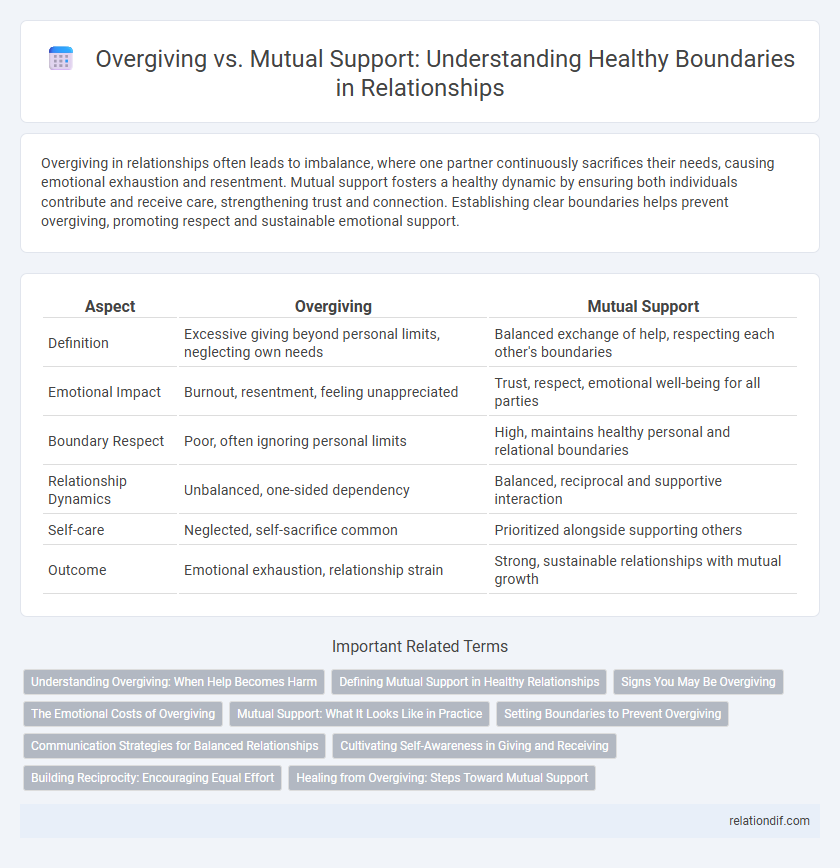Overgiving in relationships often leads to imbalance, where one partner continuously sacrifices their needs, causing emotional exhaustion and resentment. Mutual support fosters a healthy dynamic by ensuring both individuals contribute and receive care, strengthening trust and connection. Establishing clear boundaries helps prevent overgiving, promoting respect and sustainable emotional support.
Table of Comparison
| Aspect | Overgiving | Mutual Support |
|---|---|---|
| Definition | Excessive giving beyond personal limits, neglecting own needs | Balanced exchange of help, respecting each other's boundaries |
| Emotional Impact | Burnout, resentment, feeling unappreciated | Trust, respect, emotional well-being for all parties |
| Boundary Respect | Poor, often ignoring personal limits | High, maintains healthy personal and relational boundaries |
| Relationship Dynamics | Unbalanced, one-sided dependency | Balanced, reciprocal and supportive interaction |
| Self-care | Neglected, self-sacrifice common | Prioritized alongside supporting others |
| Outcome | Emotional exhaustion, relationship strain | Strong, sustainable relationships with mutual growth |
Understanding Overgiving: When Help Becomes Harm
Overgiving occurs when support exceeds personal limits, leading to emotional exhaustion and imbalance in relationships. This behavior often stems from a desire to please others but can result in enabling dependency rather than fostering independence. Recognizing the signs of overgiving allows individuals to establish healthier boundaries that promote mutual support and respect.
Defining Mutual Support in Healthy Relationships
Mutual support in healthy relationships involves a balanced exchange of care, where both individuals contribute to and receive emotional, physical, and psychological assistance without feeling drained or overwhelmed. It fosters an environment where personal boundaries are respected, ensuring that giving does not lead to overgiving or resentment. This reciprocal dynamic strengthens trust and intimacy, allowing both partners to thrive independently and together.
Signs You May Be Overgiving
Constantly prioritizing others' needs at the expense of your own emotional or physical well-being often indicates overgiving. Feeling drained, resentful, or experiencing burnout after helping others can signal a lack of healthy boundaries. Difficulty saying no and a persistent urge to fix everyone's problems without reciprocal support further highlight patterns of overgiving.
The Emotional Costs of Overgiving
Overgiving in relationships often leads to emotional exhaustion and decreased self-worth as individuals sacrifice their own needs for others. This imbalance creates resentment and undermines genuine mutual support, which relies on reciprocal care and respect. Setting clear boundaries preserves emotional health and fosters sustainable, supportive connections.
Mutual Support: What It Looks Like in Practice
Mutual support involves balanced give-and-take where both parties feel valued and respected, creating a foundation of trust and understanding. It looks like open communication, active listening, and consistent encouragement, ensuring everyone's needs are met without sacrifice or resentment. This dynamic fosters emotional resilience, strengthens relationships, and promotes healthy boundaries that protect individual well-being.
Setting Boundaries to Prevent Overgiving
Setting boundaries to prevent overgiving involves clearly defining personal limits to protect emotional and physical well-being. Effective boundary-setting promotes mutual support by ensuring that giving remains balanced and sustainable, preventing burnout. Consistently communicating needs and limits fosters respect and healthier relationships where support is reciprocal.
Communication Strategies for Balanced Relationships
Effective communication strategies for balanced relationships emphasize expressing needs clearly and setting limits without guilt to prevent overgiving. Active listening fosters mutual understanding, enabling partners to support each other equitably while respecting personal boundaries. Establishing agreed-upon expectations reduces resentment and promotes a healthier dynamic of reciprocity and emotional safety.
Cultivating Self-Awareness in Giving and Receiving
Cultivating self-awareness in giving and receiving fosters balanced boundaries by distinguishing overgiving from mutual support. Recognizing personal limits and emotional needs enhances genuine generosity while preventing burnout and resentment. This mindful approach encourages reciprocal relationships that sustain well-being and respect individual autonomy.
Building Reciprocity: Encouraging Equal Effort
Establishing boundaries fosters mutual support by promoting balanced exchanges, where overgiving is replaced with reciprocal effort. Encouraging equal participation in relationships strengthens trust, reduces resentment, and ensures emotional needs are met for both parties. Building reciprocity through clear communication and shared responsibilities enhances long-term connection and personal well-being.
Healing from Overgiving: Steps Toward Mutual Support
Healing from overgiving involves recognizing personal limits and learning to communicate needs clearly to foster balanced relationships. Establishing boundaries allows both parties to contribute equitably, promoting mutual support and emotional resilience. Consistent practice of self-care and assertiveness strengthens these boundaries, enabling sustainable, healthy connections.
Overgiving vs Mutual Support Infographic

 relationdif.com
relationdif.com